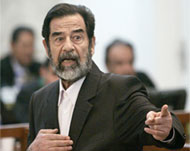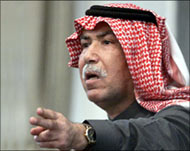Saddam judge firm on resignation
The judge trying Saddam Hussein has refused to withdraw his resignation and the court has named a stand-in to preside over next week’s hearings while efforts continue to persuade Rizgar Amin to return.

Amin’s complaints of government interference have rocked the US-sponsored court, whose ability to stage a fair trial amid sectarian and ethnic conflict had already been thrown into doubt by the killings of two defence lawyers and talk of intimidation.
“We sent a delegation from the court to convince him but it was not successful,” the chief prosecutor in the trial, Jaafar al-Moussawi, told Reuters on Monday after a mission led by another senior judge to Amin’s Kurdish home city of Sulaimaniya.
“He is standing by his resignation. He will not come to Baghdad and he will not preside over the next session.”
Sayeed al-Hamashi, the most senior of Amin’s four colleagues on the judges’ panel, would deputise on 24 January, al-Moussawi said, and the tribunal would appoint a permanent replacement later if Amin stuck by his decision to quit after further discussions.
Resignation rejected
The Iraqi government has rejected the resignation, a court spokesman said. But clearly it cannot force Amin to continue.
Al-Hamashi, the only other judge to be seen alongside Amin on television but who had not previously been named, told al-Sharq al-Awsat newspaper’s online edition: “I will preside over the trial according to the rules and regulations and the law.
 |
|
Many Shias say Saddam has been |
He added that he hoped Amin would return later: “If a judge is absent, quits or is on holiday, this does not stop … the trial since there are others to replace him.”
But while technically that is the case, the departure of the much-televised face of the court amid complaints of government interference may do lasting damage to the court’s credibility.
Speaking of the government’s efforts to persuade Amin to stay, one of Moussawi’s fellow prosecutors, Mumkidh Taklif al-Fatlawi, told Reuters on Sunday: “They are afraid of the damage this will do to the credibility of the tribunal.”
Amin, whose patience, wit and courteous manner has been much remarked on, continued to decline public comment but has made clear he is unhappy about meddling in the trial and pressure put on him from the government and other Shia leaders who accuse him of giving Saddam, a Sunni Arab, too much time to argue.
Government’s complaints
“It is a question of integrity,” a source close to the judge told Reuters on Saturday. “He had complaints from the government that he was being too soft in dealing with Saddam. They want things to go faster.”
Miranda Sissons, who has observed the trial for the New York-based International Centre for Transitional Justice, said if Amin quit “public faith in the tribunal will … disappear”.
Some human-rights groups have urged the government and US officials to hold a trial abroad in an international court.
|
“I talked to him in private and asked him why. He told me ‘I cannot take the public’s criticism any more”. |
The trial has sat seven times since 19 October. Saddam, the former president of Iraq (1979-2003) and seven others are charged with crimes against humanity for executing Shia villagers after an assassination bid against Saddam Hussein’s life in 1982.
Other trials, including for genocide, are likely to follow.
More than 140 people were either killed in the violence that broke out after the assassination attempt or were sentenced to death for having links with the assassins.
Most of those killed or executed were members of the then banned al-Dawa Party, the party of Ibrahim al-Jaafari, the current Iraqi Shia prime minister.
The government and court officials appear anxious to deny Amin’s complaints of direct pressure on him from ministers and other senior Shia political leaders keen on a quick hanging for a man they accuse of oppressing their people for decades.
Public criticism
Al-Moussawi, a Shia whose tirades against Saddam and his seven co-accused have on occasion been cut off by Amin, said he met the chief judge when he tendered his resignation a week ago:
“I talked to him in private and asked him why. He told me ‘I cannot take the public’s criticism any more’.”
 |
|
Al-Tikriti stole the limelight at |
Saddam opponents have complained about the freedom given to Saddam and his co-defendants inside the court. They argue that he did not give his opponents that freedome why should he enjoy it?
Saddam’s former opponents turned rulers of Iraq have fretted at the deposed president’s success in turning the trial to a platform for his political statements and blamed that on the judge.
Saddam’s half brother Barazan al-Tikriti, who directed the Iraqi intelligence in 1982, stole the limelight in the last trial session last December.
The source close to Amin said the judge felt constrained to let Saddam speak at length since he believed that to bar him from the courtroom would undermine the legitimacy of the trial.
More witnesses
Al-Moussawi said there would probably be three days of hearings next week, during which about 10 more witnesses would be heard.
Al-Hamashi said he would not be intimidated by facing Saddam and would also maintain due reserve in court: “I do not care that the person in front of me is a former president or Saddam Hussein or anyone else,” he told Asharq al-Awsat.
“The judge should not be forceful because he will lose his objectivity. A judge should remain calm.”